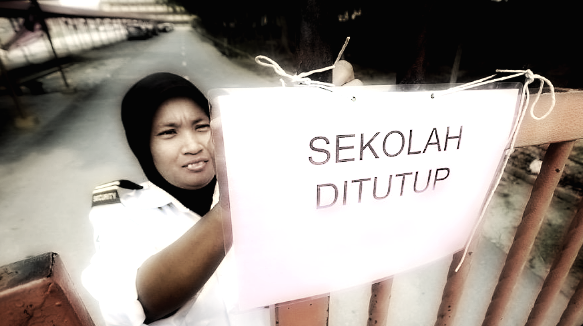Sin Chew Daily
Thanks to the invasion of the coronavirus, it is beyond doubt that our schools are no longer safe today.
Health minister Adham Baba says as many as 42 infection clusters related to schools have emerged since primary and secondary schools reopened last month, including six out of the 14 new clusters on Monday alone.
It is a matter of time that our schools will eventualy become a new "breakthrough point" for the virus. We have good reasons to believe that the positive cases now reported from schools nationwide are only the tip of the iceberg, and could be a forewarning for the virus' full-fledged invasion into our school campuses.
Because of that, parents began to get alarmed when infection cases were first reported soon after schools reopened. Many have since urged the schools to suspend classes or have passively applied leave for their own children. As a result, attendance at some schools are down to just around 20-30%.
We have to admit that other than our own homes, nowhere else is safe from the virus. The risk is always there wherever there is gathering of people, be it at schools, restaurants, malls, or workplaces. Risk of infection is always the same so long as we do not adhere to the SOPs. During the MCO, health DG Noor Hisham Abdullah urged Malaysians to stay at home before the vaccines were rolled out here.
Generally speaking, school children are more willing to follow the rules and SOPs and as such, schools are relatively safe compared to other public venues. That said, the slightest oversight could give the virus an opportunity to spread among the students.
Imagine dozens of students sitting inside the classroom listening to the teacher. They may get infected if the teacher is a virus carrier, and then spread the virus to their parents when they get home later. This is how a new infection cluster starts.

Primary and secondary school teachers and students collectively form a massive community in our society. According to the statistics released by the education ministry on February 27, there were about half a million teachers nationwide, and given the fact the cumulative total of confirmed COVID-19 cases make up 1.16% of the country's total population, we can estimate that there could be as many as 5,784 in the teachers' cluster, although so far only over a hundred have been diagnosed with the virus.
If we add in the 5.4 million primary and secondary school students in the country, the total school population comes to around 5.9 million, or approximately 18% of the total population. Imagine what kind of disaster will ensue if the education sector defense line is breached.
As such, we can understand why parents have insisted that physical classes be suspended. That said, suspending classes will not solve the problem in its entirety, and large-scale class suspension is never a good option as it will cause "learning loss" among the students (we cannot wholly count on online learning). Moreover, parents may still take their children out or allow them to go out on their own during school closure.
In view of this, the priority should be expediting the vaccination program for teaching staff nationwide because like medical frontliners they are also in the high risk group of spreading the virus. Our schools will only be safe once the source of infections is broken.
When the government was planning the nationwide immunization program late last year, science, technology and innovation minister Khairy Jamaluddin mentioned that convicts serving their jail sentences should be prioritized for vaccination. Back then we repeatedly urged th government to instead prioritize teaching staff. The minister only gave in a couple of days ago, saying teachers would be put in the priority list once vaccine supply is adequate, after considering the risks involving schools.
The decision has come a little too late, and vaccine supply and inoculation efficiency have been slow of late. This is what the government should seriously look into and improve.
Additionally, the health and education ministries should also review whether to step up or make adjustments to existing SOPs at schools to ensure our students can have a safe learning environment.
Next, the authorities must set clear guidelines for class suspension. Take the 19 schools suspended in Petaling district for instance, each reporting between one and four cases. If this is the standard, then many schools may have to suspend their classes infinitely.
We cannot afford to have no idea what to do with virus prevention measures at schools. The more ambiguous the guidelines, the more panic parents will get. In the end, they will rather keep their children home even though this will affect the students' learning progress.
ADVERTISEMENT
ADVERTISEMENT


































